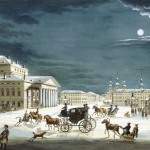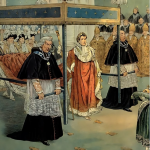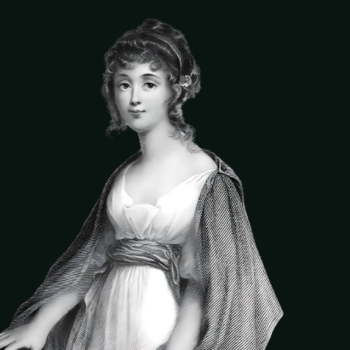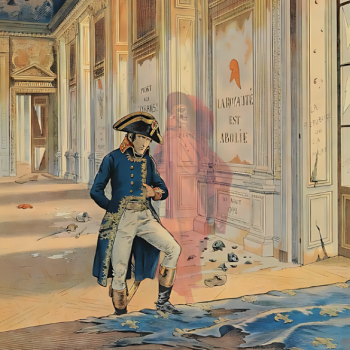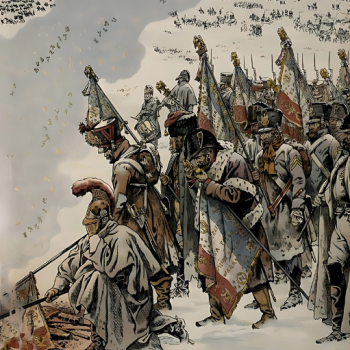A Tournament Of Shadows:
X. The Parisian Sibyl
In August 1802, Napoleon was declared the First Consul for life.[1] Jean-Baptiste Bernadotte, however, remained at the health waters of Plombières-les-Bains that autumn, beginning to despair of any honorable career in France. He turned his thoughts again to plans of emigration. The entire family was so alarmed at Napoleon’s ambitious proceedings, and so little confident in their prosperous issue that, like Bernadotte, they were seriously proposing to settle in the United States. The First Consul (who desired nothing more than to place the Atlantic between himself and Bernadotte) offered him the Governorship of Louisiana.
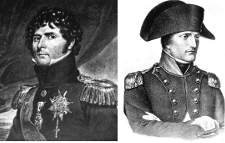
(Left) Jean-Baptiste Bernadotte. (Right) Napoleon Bonaparte.[2]
The two men were rivals, or more accurately, they were always in the opposition. The paths of the two men had crossed early in life. The ship on which Napoleon, a boy of eleven, sailed from Corsica to enter the military school Brienne was passed by one bound from Marseilles to the island which carried Bernadotte, who had just begun his military career. Born January 26, 1764, at Pau, his father was an attorney, and young Bernadotte was intended to follow the same profession, but at the age of fifteen, he enlisted as a private in the Royal Marines. After two years of service spent in Corsica, the regiment was sent to the French East Indies, where the English were engaged in “gobbling up the French possessions.” He took part in many engagements, proving himself both courageous and resourceful. While the British were besieging Cuddalore, he was wounded in a sortie and left for dead on the field. An English officer happened to come across him and found the youth was still alive. Struck by Bernadotte’s fortitude, he had him removed to his own tent and nursed to recovery. After some detention as a prisoner of war, he was exchanged, and he returned to France after an absence of nearly ten years. He found the fires of the Revolution beginning to glow, and Bernadotte became a furious Republican. While in India he had determined to resume the study of law, but, being promoted to be a sergeant, and becoming ardent with patriotism, he decided to remain in the army. Promotion to the rank of colonel came soon, and he was sent to the Army of the Rhine, where the fate of the Republic was being decided in furious battles. In the campaign in Italy, although he and Napoleon mutually distrusted each other, he was placed in command of the advance guard. “Soldiers of the Rhine, the soldiers of Italy are watching you,” were the words with which he led his division into the river at the Battle of Tagliamento, and stirred to the highest pitch of enthusiasm, his men dashed courageously toward the fire of the enemy’s batteries. As a reward for his services in this campaign, he was given the honor of carrying to Paris the colors taken from the enemy.
In January 1798 Bernadotte went to Vienna as French Minister. On April 13, a fête was given in honor of the volunteers who armed themselves to combat the French when Vienna was menaced the year before. Bernadotte considered the celebration a hostile demonstration, so he hung out the tricolor in front of his hotel and gave a rival fête in honor of the French victories. Naturally, there was a riot during which the hotel was attacked, and Bernadotte left Vienna in a rage. The Directory refused to resent the insult sufficiently, he resigned but was subsequently appointed Minister of War. His Republicanism, however, alarmed the Directory who sent him a note declaring that his “resignation had been accepted.” As he had not offered his resignation, this mode of dismissal enraged him. He consoled himself by marrying Désirée Clary, the daughter of a Marseilles merchant, and sister-in-law of Joseph Bonaparte (Napoleon’s older brother.) Napoleon had been one of her suitors, but he was out of employment at the time, and his suit was rejected by the young lady’s father who declared “that one Bonaparte was quite enough in the family.”[3]
When Napoleon returned to Paris after the Egyptian Campaign and began preparations to overthrow the Directory, he was met with some resistance by Bernadotte. He had already established his control over most of the French generals who had served under him, Bernadotte however he could not sway to his will. He was, after all, a Republican at heart.
“If you wish to be one of the number of my friends,” said Napoleon, “you will be very welcome.”
“Good friendship,” replied Bernadotte, “is possible, but I believe that you will always be the most imperious of masters.”[4]
Napoleon confessed that he thought the government officials were all lost. He spoke of external enemies and of internal ones, too. At the mention of “internal enemies,” Napoleon looked steadily in the face of Bernadotte. “But patience! The pear will soon be ripe!” Napoleon then inveighed against the violence and lawlessness of the Jacobin Club.
“Your own brothers,” Bernadotte replied, “were among the founders of that club, and yet you reproach me with favoring its principles. It is to the instruction, I know not of whom, that we are to ascribe the agitation which now prevails.”
Later, while he was on his way to turn the Conseil des Anciens and the Five Hundred out of their halls, Napoleon met Bernadotte.
“You are on the way to the guillotine,” said Bernadotte.
“We shall see,” replied Napoleon.
Shortly afterward he was in supreme control of the destinies of France.
Bernadotte was willing to serve the Consulate if not to assist in establishing it, and as commander-in-chief of the Army of the West, he prevented the English from landing at Quiberon in May 1800.
Napoleon’s distrust of Bernadotte arose not from fear of disloyalty, but from knowledge of Bernadotte’s rigid character. Soldiers of fortune, like Murat and Ney, might be bought with money or honors, but Bernadotte was motivated by higher motives. The original breach between them widened by the events of the next few years, and by the Autumn of 1802, Napoleon was quite ready to send him across the Atlantic.
The name of Louisiana had a fascination for Frenchmen, for whom its history was a romance of colonization. Its first settlers, after all, were men of French blood who had found their way there along the waters of the mighty Mississippi to the Gulf of Mexico. The territory of which they took, or claimed possession of rather, was called Louisiana in honor of the “Roi Soleil.” During the reign of King Louis XV, it had been bartered to Spain but had recently been ceded back by Spain to France. Napoleon was maturing a scheme for reestablishing French authority upon the banks of the Mississippi, as part of a large plan of Empire in the Western Hemisphere. Containing approximately 1,000,000 square miles, the Louisiana of 1802 was in size and productiveness an empire in itself, but with a population of only 80,000, it was sparsely populated. It was intended that Bernadotte’s mission should be one of conquest, as he was also instructed to take possession of the “Floridas.”
Bernadotte, who saw in this a career of independence and of glory far away from Napoleon, quickly made himself familiar with the history and the material conditions of the colony. He cherished the dream of making it a flourishing center of commerce and of civilization. He soon realized the impossibility of defending or developing so large an area without introducing “fresh blood,” so he laid it down as a condition of his acceptance, that 3,000 soldiers and an equal number of cultivators, should be placed at his disposal and maintained by France for two years.
Napoleon refused to listen to any such conditions. “I would not do so much,” he said, “even for one of my own brothers.”
Bernadotte, when his conditions were refused, regretfully declined the appointment.
The proposed establishment of French authority in Louisiana soon became the subject of agitation and controversy in the United States, where a powerful segment of public opinion advocated for the invasion and conquest of the Colony.
Napoleon now offered Bernadotte the post of Ambassador plenipotentiary to the United States, which appeared to be one of special importance (owing to the pending differences between the two countries.) Bernadotte agreed to accept the appointment in January 1803 but delayed his departure until Napoleon sent him peremptory orders to repair at once to Washington.
When Bernadotte started on his mission, he was unaware that secret negotiations were proceeding which would deprive it of all its significance. On April 10, Napoleon suddenly made up his mind to sell Louisiana to the United States for eighty million francs. (A useful contribution to the expenses of the impending war.) On April 12, the very day of Bernadotte’s departure, James Monroe arrived in Paris as Minister Plenipotentiary to France, and Napoleon appointed Barbé Marbois to negotiate with him. These diplomatic arrangements, of which Bernadotte was kept entirely ignorant, converted his diplomatic mission into a mere fool’s errand without any serious object or purpose.
Before he was made aware of any of this, however, he took a long look at his home on the day of his departure.
“I am, perhaps, looking at my country home for the last time,” Bernadotte told Colonel Gerard, his aide-de-camp who was accompanying him.
“I don t believe a word of it,” Gerard replied.
Bernadotte pressed for an explanation.
“I was taken by a relative to visit a fortune teller,” Gerard explained. “She foretold that you and I would be prevented from leaving France by unforeseen circumstances.”
The fortune teller’s prophecy was strangely fulfilled.
When they arrived at La Rochelle, the vessel that was to have taken them to America was counter-ordered to carry General Ernouf to Guadeloupe. A second vessel, which was to carry Bernadotte and his family, was recalled to convey supplies to the army in St. Domingo. A third vessel was being prepared when the Paris newspapers reached La Rochelle, announcing that the negotiations with the United States had been concluded, and Lord Whitworth (the English Ambassador) had left Paris on May 12 and that on May 16 war had been declared between France and England. When Bernadotte became aware that Louisiana had been sold to the United States, and that war was imminent between France and England, he at once resolved to throw up his diplomatic appointment.
Napoleon, who had hoped to rid himself of Bernadotte, was not pleased at his sudden return. Joseph Bonaparte intervened, and the First Consul made the best of the situation. He could not find a suitable command for the ambitious Bernadotte, in any case, so he retained him in his rank of General-in-Chief (without active service.)
As the prophecy of the Parisian fortune-teller was so strangely fulfilled, Colonel Gerard persuaded Bernadotte to pay a visit to the sibyl on his return to Paris. Gerard introduced Bernadotte to her as a wealthy merchant who managed important business enterprises in Germany, and who wished to know if his business interests were likely to succeed.
“You are not a merchant, sir,” said the prophetess. “No, you are a soldier of high rank. You are a relative of the First Consul, who will be Emperor. Beware of quarreling with him, for he will be very powerful, and will have the world at his feet—and you, sir, at a great distance from him will be King, yes, you will cross the sea to be King.”[5]
SOURCES:
[1] De Bourrienne, Louis Antoine Fauvelet. Memoirs Of Napoleon Bonaparte: Vol. I. Charles Scribner’s Sons. New York, New York. (1892): xliii-lii. [Chronology Of Bonaparte’s Life.]
[2] Barton, Dunbar Plunket. Bernadotte And Napoleon, 1763-1810: Vol. II. John Murray. London, England. (1921): Frontispiece, 10.
[3] “Napoleon’s Marshals: VI. Bernadotte, King Of Sweden.” The Illustrated American. Vol. VI, No. 58 (March 28, 1891): 297-301.
[4] Barton, Dunbar Plunket. Bernadotte And Napoleon, 1763-1810: Vol. II. John Murray. London, England. (1921): 4..
[5] Barton, Dunbar Plunket. Bernadotte And Napoleon, 1763-1810: Vol. II. John Murray. London, England. (1921): 66-71.


